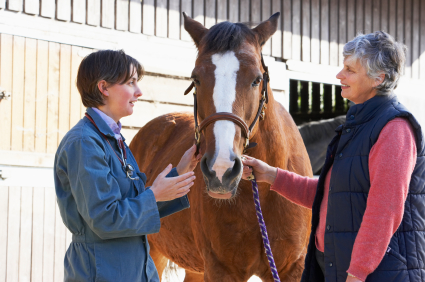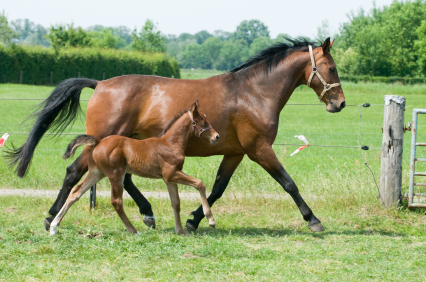 Now that your mare is safely checked in foal, the next step in the journey begins. It is time to plan ahead for the care and management of your pregnant mare and for welcoming the arrival of your foal. A major first step is, where will your mare foal out? If she is to foal out at home it is assumed you have a suitable foaling stall, a pasture with shelter and safe fencing to house the mare and her foal. Research and start to compile your foaling kit, emergency plans and contacts, secure a source of colostrum and research options for nurse mares. Of course, we all hope for a normal, successful delivery, but we have to be prepared for worst case scenarios. If the unexpected happens at such an emotional time, having a plan in place will alleviate stress and save time when tough decisions must be made. If your mare will foal out at another facility, plan on moving her 20-30 days prior to foaling so she can build up immunity to her new local environment.
Now that your mare is safely checked in foal, the next step in the journey begins. It is time to plan ahead for the care and management of your pregnant mare and for welcoming the arrival of your foal. A major first step is, where will your mare foal out? If she is to foal out at home it is assumed you have a suitable foaling stall, a pasture with shelter and safe fencing to house the mare and her foal. Research and start to compile your foaling kit, emergency plans and contacts, secure a source of colostrum and research options for nurse mares. Of course, we all hope for a normal, successful delivery, but we have to be prepared for worst case scenarios. If the unexpected happens at such an emotional time, having a plan in place will alleviate stress and save time when tough decisions must be made. If your mare will foal out at another facility, plan on moving her 20-30 days prior to foaling so she can build up immunity to her new local environment.
Nutrition
For the first half of her pregnancy, the nutritional needs of your pregnant mare do not change. She can continue with her normal feeding program. Make sure she is getting a good vitamin and mineral supplement along with her feed, in addition to enough pasture and/or hay to maintain her weight. Starting around the 5th month her nutrition requirements increase and her diet should be adjusted accordingly. See our informative news article Feeding the Pregnant Mare by nutritionist Dr. Clair Thunes for more information. 
Vaccinations
Vaccination against Rhinopneumonitis (Rhino) caused by Equine Herpesvirus Type 1 (EHV-1) is particularly important for the pregnant mare since infection can result in abortion. EHV-1 is highly contagious, with transmission usually occurring through the respiratory route. Many horses become latent carriers of the disease after infection, displaying no obvious symptoms. Exposure to horses shedding the virus, or reactivation of the latent virus with the stress of pregnancy can result in infection; the virus can cross the placenta and cause the foal to be aborted. Abortion can occur from 2 weeks to several months after infection. Abortion usually occurs in late pregnancy but can occur as early as the 4th month of pregnancy. If a mare is infected during late pregnancy, her foal may be stillborn or born alive, but die within a few days of birth. It is recommended that mares be vaccinated against EHV-1 in the 5th, 7th and 9th month of her pregnancy. In higher risk situations where your mare will have exposure to non-vaccinated horses or horses that travel, it is recommended that the first Rhinopneumonitis immunization be given at 3 months. Currently, there are two killed virus vaccines approved for use in pregnant mares to prevent EHV-1 abortion: Pneumabort-K® (Fort Dodge Animal Health, Ft. Dodge, IA) and Prodigy® (Intervet, Inc., Millsboro, DE).
It is important for your mare to receive vaccinations to booster her regular immunizations 4 to 6 weeks before her due date to provide a high level of antibodies in her colostrum. Immunizations at this time should include everything your mare would require for the year according to her location and climate. The AAEP has published a very informative database on the Core Vaccinations and Risk Based Vaccinations horses need depending on location, use of the horse and pregnancy. The "pre-foaling vaccinations" are critical for the foal's health. The foal depends entirely on these antibodies absorbed from the colostrum to protect him for about the first 6 months of life until he produces his own antibodies.
It is very important that any vaccines given to a pregnant mare is a killed or inactivated preparation. Live vaccines should not be given to pregnant mares. Additionally, many veterinarians prefer to avoid vaccinating mares during the first 90 days of pregnancy when the pregnancy is in its most fragile state.

Deworming
Routine deworming of the pregnant mare throughout gestation will decrease the exposure of the newborn foal to parasites. Therefore your mare should be dewormed regularly, according to the schedule set by your veterinarian for your particular climate with the last treatment occurring 4-6 weeks before her due date. Of particular relevance are the larvae of the intestinal threadworm, Strongyloides westeri. They can migrate to the mammary gland and be passed to the foal through the milk. Strongyloides westeri can cause diarrhea in foals and may predispose the foal to other intestinal problems. Many veterinarians recommend the mare receive an Ivermectin dewormer within 12 hours of delivery to minimize the risk of transferring this parasite. Breeders report that this protocol helps to prevent foal scours. Most commercially available dewormers are safe for use in pregnant mares, however, it is always recommended to check the product label before administering a dewormer or any other product to a pregnant mare.
Additional Considerations
 It is a general recommendation that annual dental examinations and procedures be performed before the mare is bred or after the mare foals to avoid the stress of the procedure(s), potential complications from infection and sedation while pregnant.
It is a general recommendation that annual dental examinations and procedures be performed before the mare is bred or after the mare foals to avoid the stress of the procedure(s), potential complications from infection and sedation while pregnant.
Your mare should be removed from any pastures containing tall fescue 60-90 days before her due date. Equine fescue toxicosis is caused when pregnant mares eat tall fescue that is infected with the endophyte fungus, Acremonium coenephialum. Symptoms include prolonged gestation, thickened placentas (e.g. red bag deliveries), dystocia, neonatal death or dysmaturity, agalactia or reduced milk production.
After the Foal is Born
 When your foal is born he should have a thorough post natal or "Foal" exam at about 12 to 18 hours of age. The foal exam is usually performed the following business day depending on the time of the birth and when the foal first nursed. Make sure the foal is nursing within about 3 hours of birth, receiving a good supply of colostrum within the first 4-8 hours. If your foal has not stood and nursed within 3 hours of age, you should contact your veterinarian. Most veterinarians prefer to run an lgG blood test 12 to 18 hours after birth to ensure antibodies supplied by the mare's colostrum have been sufficiently absorbed by the foal. With the antibody rich colostrum the foal is protected against the diseases his dam has immunity against. That protection typically lasts for the first 6 months of life. It is not recommended that foals receive any vaccinations before 4-6 months, but there are some exceptions if the risk of a certain disease is high.
When your foal is born he should have a thorough post natal or "Foal" exam at about 12 to 18 hours of age. The foal exam is usually performed the following business day depending on the time of the birth and when the foal first nursed. Make sure the foal is nursing within about 3 hours of birth, receiving a good supply of colostrum within the first 4-8 hours. If your foal has not stood and nursed within 3 hours of age, you should contact your veterinarian. Most veterinarians prefer to run an lgG blood test 12 to 18 hours after birth to ensure antibodies supplied by the mare's colostrum have been sufficiently absorbed by the foal. With the antibody rich colostrum the foal is protected against the diseases his dam has immunity against. That protection typically lasts for the first 6 months of life. It is not recommended that foals receive any vaccinations before 4-6 months, but there are some exceptions if the risk of a certain disease is high.
Once your foal has safely arrived and your mare and her baby are settled, you can take some pride in your accomplishment. Now the enjoyment and responsibility of raising your foal to be everything you had hoped begins.
See Also:
Useful link - AAEP Vaccination Guidelines


Log in to join the conversation.